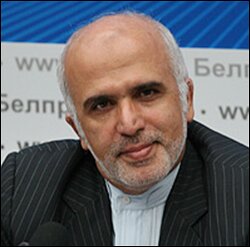Другие материалы рубрики «English»
-
 Minsk City Court upholds prison terms for three post-election protesters
Minsk City Court upholds prison terms for three post-election protesters
Alyaksandr Atroshchankaw, Dzmitry Novik and Alyaksandr Malchanaw were found guilty of participation in “mass disorder” under Part Two of the Criminal Code’s Article 293... -
 Journalist Natallya Radzina staying in refugee camp
Journalist Natallya Radzina staying in refugee camp
Natallya Radzina, editor of opposition news site charter97.org, is staying in a foreign country's refugee camp...
- Trade ministry opposition any restrictions on import of expensive liquors
- Moody`s downgrades ratings of six Belarusian banks
- Belarus is interested in new friends in America, Lukashenka says
- Organizers apply to Minsk authorities for permission for Chernobyl anniversary march
- Mikhalevich comments on videos released by authorities
- Lyapis Trubetskoi fans stage rally in Minsk over their idols’ banned concerts
- Authorities release videos of Mikhalevich's conversations with KGB officers
- Waiting lists of Minsk residents in need of better housing conditions will not be revised for time being
- Belarusian Popular Front preparing for eviction
- Ramanchuk set to continue political activities
English
Iranian ambassador condemns US sanctions against Belarusnafta
 The Unites States’ sanctions against Belarus’ state oil company Belarusnafta because of its contract with Iran`s NaftIran Intertrade Company were imposed on the basis of an unreasonable and unjust law, Iranian Ambassador Seyyed Abdollah Hosseini said in an interview with BelaPAN on Friday.
The Unites States’ sanctions against Belarus’ state oil company Belarusnafta because of its contract with Iran`s NaftIran Intertrade Company were imposed on the basis of an unreasonable and unjust law, Iranian Ambassador Seyyed Abdollah Hosseini said in an interview with BelaPAN on Friday.
On March 29, the Department of State announced that the USA had imposed sanctions on Belarusnafta over its $500-million contract with the NaftIran Intertrade Company for the development of the Jufeyr (Jofeireh) oil field, which was signed in 2007.
The sanctions were introduced under the Iran Sanctions Act of 1996 as amended by the Comprehensive Iran Sanctions, Accountability, and Divestment Act of 2010 (CISADA).
The Act was enacted as an "appropriate response to Iran’s longstanding use of its oil and gas sector to facilitate its proliferation activities and thereby its noncompliance with its nuclear obligations."
The sanctions prevent Belarusnafta from seeking any loans or doing any business in US financial markets.
State Department spokesman Mark Toner said that, in practical terms, the action prohibits Belarusnafta from seeking assistance from the Export-Import Bank of the United States, obtaining US government export licenses, obtaining private US bank loans exceeding $10 million, and securing any procurement contracts with the US government.
According to the Iranian ambassador, the sanctions against Belarusnafta were imposed under a US law that provides for imposing sanctions on companies that invest more than $20 million in Iran. “The joint Jufeyr project is one-hundred-percent financed by the Iranian company, with its investment amounting to $500 million,” he said. “The company has already invested $200 million and the remaining $300 million will come from the sale of the oil that will be produced there.”
“The United States was guided by false information,” the ambassador said. “It is deplorable the country that regards itself as one of the world leaders acts in such a manner. I’m convinced that the USA is completely wrong and should apologize to Belarus, but it will hardly do so.”
According to Mr. Hosseini, Iranian-Belarusian oil production in the Jufeyr oilfield, located some 50 miles southwest of the city of Ahvaz in the province of Khuzestan, initially amounted to 3,000 barrels a day, but it increases and should reach 30,000 barrels.
When asked about the possibility of an exchange of visits at the highest level, the ambassador said: “As a rule, such decisions are made by the Presidential Administration. As soon as the Belarusian government proposes a date, we’ll promptly arrange for such a visit to take place.”
The ambassador stressed that Iran “has the highest respect for Belarus and highly values its relations with Belarus.”
"Since President Barack Obama signed CISADA into law on July 1, 2010, Iran`s ability to attract new investment to develop its oil and natural gas resources, and to produce or import refined petroleum products, has been severely limited," the Department of State said in its press release. "The State Department`s direct engagement with companies and governments to enforce CISADA is raising the pressure on the Government of Iran."
According to Mr. Toner, the Untied States "also sends a message to our partners in Europe as well that this is a company that we`ve decided to sanction." "And I`m sure they have access or would seek access into European markets," he said.
Earlier, the United States persuaded five major multinational energy companies to pledge to end their investments in Iran and provide assurances not to undertake new energy-related activity in Iran that may be sanctionable. The companies were Total of France, Statoil of Norway, ENI of Italy, Royal Dutch Shell of the Netherlands, and INPEX of Japan.
The Belarusian government announced in August last year that Belarusian-Iranian oil production in Iran would increase to nine million tons within 10 years.
Ambassador Hosseini told reporters in Minsk in February 2010 that the joint development of the Jufeyr oilfield was the only project in which Belarus was involved as an investor.




В настоящее время комментариев к этому материалу нет.
Вы можете стать первым, разместив свой комментарий в форме слева